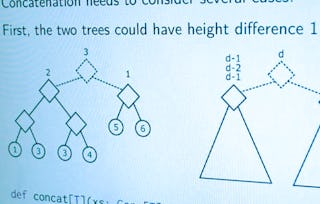This course introduces the fundamentals of high-performance and parallel computing. It is targeted to scientists, engineers, scholars, really everyone seeking to develop the software skills necessary for work in parallel software environments. These skills include big-data analysis, machine learning, parallel programming, and optimization. We will cover the basics of Linux environments and bash scripting all the way to high throughput computing and parallelizing code. We recommend you are familiar with either Fortran 90, C++, or Python to complete some of the programming assignments.

Introduction to High-Performance and Parallel Computing

Introduction to High-Performance and Parallel Computing
This course is part of High-Performance and Parallel Computing Specialization


Instructors: Shelley Knuth
21,187 already enrolled
Included with
160 reviews
What you'll learn
Navigate a typical Linux-based HPC environment
Describe the components of a high-performance distributed computing system
Assess the differences between serial and parallel programming
Estimate speedup and efficiency by generating a scaling study
Skills you'll gain
- Distributed Computing
- Command-Line Interface
- Computer Systems
- Operating Systems
- Programming Principles
- Bash (Scripting Language)
- Performance Tuning
- Big Data
- Linux
- File Systems
- Scripting
- Scalability
- Skills section collapsed. Showing 11 of 12 skills.
Details to know

Add to your LinkedIn profile
4 assignments
See how employees at top companies are mastering in-demand skills

Build your subject-matter expertise
- Learn new concepts from industry experts
- Gain a foundational understanding of a subject or tool
- Develop job-relevant skills with hands-on projects
- Earn a shareable career certificate

There are 4 modules in this course
Get to know the basics of an HPC system. Users will learn how to work with common high performance computing systems they may encounter in future efforts. This includes navigating filesystems, working with a typical HPC operating system (Linux), and some of the basic concepts of HPC. We will also provide users some key information that is specific to the logistics of this course.
What's included
9 videos4 readings1 assignment2 programming assignments2 discussion prompts
During this week we will actually begin to use HPC infrastructure. Some concepts we will learn are - how to load software appropriately onto an HPC system, what the different types of nodes a user can expect to encounter on a system, and how to submit a job to conduct work, such as perform calculations.
What's included
6 videos1 assignment2 programming assignments
In this module, we will introduce users to the nuances of memory on a high performance computing system. We will also cover some ways to conduct work on a system most efficiently. We will also introduce some beginning components of parallel programming.
What's included
6 videos1 assignment1 programming assignment
In this module, we will continue to review topics related to using a high performance computing system most efficiently, including scaling your workflow measuring how efficient your work on a system is, and how to utilize as much of the computing resource as possible.
What's included
4 videos1 reading1 assignment2 programming assignments
Earn a career certificate
Add this credential to your LinkedIn profile, resume, or CV. Share it on social media and in your performance review.
Build toward a degree
This course is part of the following degree program(s) offered by University of Colorado Boulder. If you are admitted and enroll, your completed coursework may count toward your degree learning and your progress can transfer with you.¹
Instructors

Offered by
Explore more from Software Development
 Status: Free Trial
Status: Free TrialUniversity of Colorado Boulder
 Status: Free Trial
Status: Free TrialUniversity of Colorado Boulder
 Status: Free Trial
Status: Free TrialUniversity of Colorado Boulder
 Status: Free Trial
Status: Free TrialÉcole Polytechnique Fédérale de Lausanne
Why people choose Coursera for their career

Felipe M.

Jennifer J.

Larry W.

Chaitanya A.
Learner reviews
- 5 stars
40.62%
- 4 stars
24.37%
- 3 stars
14.37%
- 2 stars
10%
- 1 star
10.62%
Showing 3 of 160
Reviewed on Aug 15, 2022
The content is a good start for those who had little programing experience. The assignments drove me creazy. Exploring the discussion forum to see hints for assignments will save you a lot of time.
Reviewed on Feb 5, 2025
Expected more details on Slurm and efficiency optimization
Reviewed on Jun 8, 2021
A very good and interesting HPC introduction course!

Open new doors with Coursera Plus
Unlimited access to 10,000+ world-class courses, hands-on projects, and job-ready certificate programs - all included in your subscription
Advance your career with an online degree
Earn a degree from world-class universities - 100% online
Join over 3,400 global companies that choose Coursera for Business
Upskill your employees to excel in the digital economy
Frequently asked questions
To access the course materials, assignments and to earn a Certificate, you will need to purchase the Certificate experience when you enroll in a course. You can try a Free Trial instead, or apply for Financial Aid. The course may offer 'Full Course, No Certificate' instead. This option lets you see all course materials, submit required assessments, and get a final grade. This also means that you will not be able to purchase a Certificate experience.
When you enroll in the course, you get access to all of the courses in the Specialization, and you earn a certificate when you complete the work. Your electronic Certificate will be added to your Accomplishments page - from there, you can print your Certificate or add it to your LinkedIn profile.
Yes. In select learning programs, you can apply for financial aid or a scholarship if you can’t afford the enrollment fee. If fin aid or scholarship is available for your learning program selection, you’ll find a link to apply on the description page.
More questions
Financial aid available,

